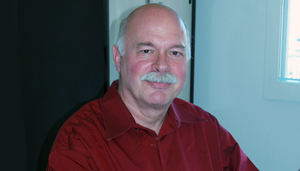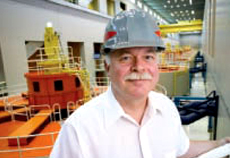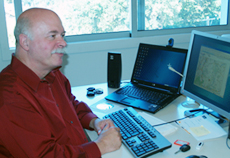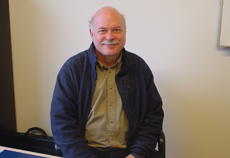S P E C I A L R E P O R T
BIP interviews Gerald Sheblé, INESC Porto LA Fellow
INESC Porto provides excellent chain of research to Universities in the USA and EU 
This edition of BIP highlights the decision of INESC Porto’s Board to create an honorary bond with INESC Porto LA – a network of Fellows.
Gerald Sheblé, Professor of Electrical and Computer Engineering at Portland State University (PSU), has stood out in several areas such as power systems, information flow and analysis, auction market and financial engineering. He is one of the first members to be included on this network of Fellows.Elected as IEEE Fellow in 1996, this researcher has already collaborated with INESC Porto in 2002 and he has now returned to the institution. Sheblé is the scientist in charge of the research project “Electricity Markets Simulation Platforms: Metrics, Analysis and Model Validation” from the Power Systems Unit.
In an interview for BIP, Gerald Sheblé talked about what it means to be selected for the title of Fellow, about R&D activities in Portugal and in INESC Porto, as well as about his most recent project in the USA: the Energy Systems Information Laboratory (ESIL).
 What did you think about the invitation to become one of the first INESC Porto's Fellows? What did you think about the invitation to become one of the first INESC Porto's Fellows?
I was pleased and honoured to be selected as the first INESC Porto Fellow. It is an honor to be identified as a significant contributor by other top researchers. As a Fellow at the University of Canterbury, Christchurch, New Zealand, I was connected to a network of individuals, other fellows, who have made substantial contributions in their own fields at other universities around the world. Since I am well aware of the contributions from researchers at the University of Porto, it is very pleasing to be honoured by those whom I respect as excellent researchers within my field of interests.
Which are, in your opinion, the major benefits that a network of "Fellows" can bring to an institution such as INESC Porto?
A network of Fellows establishes the footprint of a university outside the immediate area where it is located. We are in a global economy with global energy problems that we must all solve for any one of us to solve them successfully. The equipment produced, the energy consumed, and the technology improvements benefit all of us not only directly, but indirectly thorough the energy commodity and equipment markets.

In 2002, you started dividing your work between the USA and Portugal. At that time, you said that the USA would have a lot to learn from Portugal and INESC Porto in particular. What were, in your opinion, the major achievements from this collaboration, not only for the Iowa State University, now Portland State University, but also for yourself?
Portugal and other countries within the European Union have the same problems to solve as the USA. Portugal, as well as several other European countries, have expanded the use of renewable energies at a pace that is very aggressive. Portugal and other EU countries are achieving a very high level of renewable energy generation that is providing an excellent basis for future cost of production in a global economy. ISU and PSU have benefited from the introduction of examples and of philosophies generated by the excellent staff at FEUP. The researchers at INESC/FEUP have benefited from understanding the differences between the USA and Portugal as well as between the USA and the EU. I have benefited from the experience of not repeating the same old solution path that is hard to escape without the questions to explain why there are differences in the first place.
 How do you assess INESC Porto's progression as an R&D institution since 2002? How do you assess INESC Porto's progression as an R&D institution since 2002?
INESC Porto has continued to provide an excellent research stream for all universities in the USA and the EU to follow, to expand, and to implement. The level of research has continued to climb both in quantity and in quality. INESC is viewed as one of the major institutions that can offer techniques, models, and other solutions when renewable resources are the major source with a minimal emission footprint.
On a broader perspective, what do you feel has changed in the way Portuguese researchers view research?
I have observed that Portuguese researchers are now aware that they have respect from universities around the globe. Portuguese researchers are now identified as the people who have the answers to many of the energy problems.
Which are the goals that you still aim to achieve from the collaboration between the Portland State University and INESC Porto?
My immediate goal is to exchange ideas and content of courses in the area of sustainable energy. Renewable energy is the key solution to the global energy crisis that is now paralyzing the world. I also hope that we can increase our interaction on a shared project basis.

Almost two years have passed since the establishment of the Energy Systems Information Laboratory (ESIL). What do you think is the balance of the work that has been developed thus far?
ESIL was designed to bring awareness that the energy solutions have not changed dramatically as the energy crisis has unfolded. The basic machine designs have not changed, the appliance designs have not changed, the design of transmission and of distribution equipment has not changed. What has changed is the price of oil, and thus the value of eliminating dependence upon oil.
Portugal, based on a history of success and of government interaction, has found a method to engineer a good first solution that will provide the funds for other future solutions. It is also the vast improvements in the computer domain that is providing the communication, control, and scheduling of renewable resources that is so unique today. We are now moving into an era of increased communications through the internet that we enable us to mitigate the impact of human life on the environment and the shift from an oil based economy to a sustainable energy economy.
|


 What did you think about the invitation to become one of the first INESC Porto's Fellows?
What did you think about the invitation to become one of the first INESC Porto's Fellows?
 How do you assess INESC Porto's progression as an R&D institution since 2002?
How do you assess INESC Porto's progression as an R&D institution since 2002?